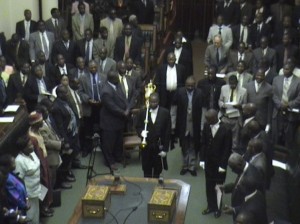Walking a Thin Line : The political and humanitarian challenges facing Zimbabwe’s GPA leadership – and its ordinary citizens
The Global Political Agreement signed on 15th September 2008 was an uneasy compromise between the two MDCs and Zanu PF, and was the result of a combination of factors: the weakening of both Zanu PF and the opposition, together with the social and civic forces that supported the MDCs; the disastrous economic and humanitarian descent in the country; pressure from SADC; and growing international isolation of the Mugabe regime. Moreover while for Zanu PF the GPA was a modality to claw its way out of the economic crisis and to begin a normalistion of international relations, the MDCs accepted the agreement as their only viable route to power, and a vital opportunity to begin a process of national political and economic revival.
The Transitional Government will continue to manifest the challenges of the Zimbabwe crisis, demonstrating the complexity of the national, regional and international dimensions of the situation. The new government has to face the challenges of dealing with overlapping legacies of colonial inequalities and post-colonial authoritarian rule, while attending to the post Cold War demands of North-South relations. In such a context the wrong forms of international interventions could well encourage divisions in the democratic movement, as well as a new convergence around nationalist questions of sovereignty across party lines, in the face of mounting frustrations caused by limited international support. In the absence of sound alternatives to the current political arrangement, the slow international response to the needs of the new government could strengthen the hand of the more regressive elements of the ruling party in the military and security, while frustrating the democratic forces within the transitional state. This risks around limited engagement with the transitional arrangement are much greater that a more substantive engagement by the international community.
A major obstacle to the GPA has been the continued failure of the new government to create a situation in Zimbabwe where there is total respects for human rights and the rule of law, notwithstanding the fact that the scale of harassment of civic and opposition members has been reduced from the extreme repression of 2008. The international community is unlikely to engage with any meaningful financial assistance until there is a clear return to the rule of law, respect for property rights and the genuine opening up of the media. However, the failure of the international community to engage could well threaten the fragile state of the GPA, which if it were to collapse, would lead to another round of violence and repression.
An uneasy calm prevails in some parts of the country, while in others tensions remain high in the wake of the horrific violence of 2008. This serves to underline the need for healing in Zimbabwe and it is commendable that a Ministry of National Healing has been established. There is need for this organ to allow for the encompassing of a variety of approaches. It is unlikely that the compromised space of the GPA will allow for high level prosecutions or for the establishment of an effective truth commission, but debates about the future possibility of such processes should begin. To facilitate such processes and to deepen democratic debate in the country media reform needs to be speeded up.
Access to Humanitarian resources and coping strategies in Matabeleland.
In focusing on the access to humanitarian resources and the coping strategies in one part of the country, Matabeleland, the following major findings were recorded:
- In 2008 families were largely excluded from access to both health and education. While over the last six months there has been some improvement in access to education, and some erratic improvement in rural clinic delivery, the situation in rural Zimbabwe in 2009 remains generally dire.
- The majority of families interviewed (65%) have not harvested more than a few months of grain, and will be in need of donor food relief again by September 2009. This food security is already being undermined by the fact that families in rural Zimbabwe do not have access to foreign exchange, meaning that they are being forced to pay school fees, bus fares and grinding mill fees with their meager harvests. Bartering and the loss of able-bodied people to the Diaspora continue to impoverish rural Zimbabweans, increasing the already heavy burden on female-headed households.
- Because most rural families have little or no access to foreign exchange, it is not financially viable for small business owners in rural business centres to restock, given the limits of the local market.
- Political violence is not apparent in rural Matabeleland. Democratic spaces have opened up and people are able to meet more freely and debate contentious issues without interference. However in Bulawayo itself problems persist, with students and members of WOZA arrested and assaulted this year when conducting peaceful demonstrations.








![Valiant teachers at Hopley Farm, Harare, do their best to provide education in this ‘illegal school’ for around 680 of the 2,000 children here, who have no other opportunities to learn. They need a proper building, with plumbing and toilets, to register the school… [May 2010] Valiant teachers at Hopley Farm, Harare, do their best to provide education in this ‘illegal school’ for around 680 of the 2,000 children here, who have no other opportunities to learn. They need a proper building, with plumbing and toilets, to register the school… [May 2010]](http://solidaritypeacetrust.org/wp-content/gallery/a-fractured-nation/thumbs/thumbs_image067.jpg)




![PASSOP, an NGO supporting Zimbabweans in De Doorns, is banned from entering the IDP camp, and here holds a meeting with them through the fence! They deliver “the Zimbabwean” newspaper – news from home read avidly. [30 May 2010] PASSOP, an NGO supporting Zimbabweans in De Doorns, is banned from entering the IDP camp, and here holds a meeting with them through the fence! They deliver “the Zimbabwean” newspaper – news from home read avidly. [30 May 2010]](http://solidaritypeacetrust.org/wp-content/gallery/a-fractured-nation/thumbs/thumbs_image117.jpg)